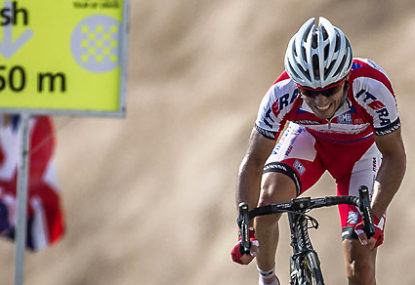'I've just won a stage of the Tour de France, mate!': Hindley grabs yellow jersey as Aussie blows Tour apart
Australia's Jai Hindley has said he is "lost for words" after a shock stage victory at the Tour de France earned him the leader's…

My friend was telling me about his core strength program. A very muscly guy and a strong cyclist – a road sprinter with plenty of power for smaller climbs – he said, “I don’t believe in the ‘plank’, it’s too easy, it does nothing, I don’t know why people do it.”
I was baffled with the obvious ignorance, but it was just a reaffirmation to me of how we are all so tremendously different in physical capability. Train your weaknesses.
Over the past five years I have strived to test what my then-prospering colleagues preached. What you’ll find is, more often than not, the practices are unconventional.
At a semi-professional level cycling is a crude mix of natural ability and the ability to suffer that allows for ‘success’. It’s not usually the minute details like weighing food, cleat angle or handlebar weight that have drastic effects.
That is why semi-pro riders often still entertain suboptimal behavioural characteristics. They have relied on talent and true grit to succeed so far, but remain inexperienced and unknowledgeable on many fronts.
I have had winning teammates in the past that feast on lollies every day, and so I did too. Some of my ex-teammates ate no fat whatsoever, and some ate a block of chocolate every night, and a croissant at the cafe the next day. I tried those tricks too. Teammates that drink profuse quantities of booze weekly; I’ve had them and tried that too.
Well, how different we all are.
It’s easy to see and say it in hindsight, but when peer pressure is happening all around and those teammates consuming or acting in manners which reject logical justification (i.e. fat and sugar is bad, vegetables are good) succeed, it makes it difficult to stay on track.
So many people I know that eat and train well are useless cyclists, and so many that eat like pigs are ravenous victory-consuming animals on the bike. Even with comparable training programs, this is often the case.
Unfortunately we aren’t all naturally the same from the start and many people, like my friend in situation A, are much more gifted than the rest of us. They require less training for fitness, injure less, suffer less post-crash, entertain higher naturally occurring testosterone levels, or many other welcome attributes we cyclist crave.
What do us mortals do then? We just have to work on it.
Eat almonds and fish and Brazil nuts and organic steak; get the good nutrients. Do Pilates every day until you create enough core-based muscle memory that you can back off to a couple of days a week. Train at higher heart rates don’t chew on so much comfort food when your body is stressed.
Always remember, your body can change, it will change if you ask it to. Want bigger muscles? Tear your smaller ones to tell your body “I need more strength!” Then provide the protein and nutrients to allow for those chemical reactions to occur. It’s all possible… mostly.
So what might be pushing us back, that is, actually reversing progress? Consider what you’re doing off the bike.
Your desk job is hurting you. The flexion of groin muscles, tendons, and hip flexors, as well as the coincidental glute muscle extension for long periods of time, every day, isn’t beneficial to cycling performance. The gluteal extension provides strain on hamstrings, sacroiliac ligaments, and the lumbar (lower) spine.
The obvious consideration here is the ‘good posture theory’. Where bad sitting posture pulls your lower back ‘outward’ and strains your lumbar spine facet joints, as well as stressing the connections your spinal muscles and tendons make into your pelvis, good posture doesn’t.
Good posture can be achieved through core strengthening in your Pilates or yoga classes. Standing desks are great too. Stretch outwards! Riding in a seated position, then sitting all day, even at the computer reading this article, is creating an overbearing tightness on your relatively weak hip flexors. This will provide a serious imbalance in the long run.
What about your work shoes? They’re killing you. Walking around in hard enclosed shoes all day doesn’t allow your foot muscles to actually function how they would like to.
If you have wondered what’s with the trend in those super-ugly finger shoes lately, that’s the key. Utilise the muscles in your feet, because they’re the platform your ankles, knees, hips plant their power. Walk bare foot, it has been shown to help more than we mortals could understand.
Another issue with desks and computers and sitting is the fore-reaching of our pectoral muscles. This stresses our spines over time, and tightens up the ligaments in the associated ribs. This will create great tightness and restriction when breathing hard.
Are you coughing after you do a sprint set? If you aren’t sick it’s likely this is your culprit. Have a crack at laying backwards on a fit-ball, with your arms out to the sides.
To conclude, be aware that so many activities in our day jobs, in conduction with riding a bicycle, double up on the imbalanced stressing of our fragile bodies. Just because your muscly friend hasn’t ever needed to do core-workouts, doesn’t mean you don’t either.
Keep alert early on to tightness from riding or working, consider stretching and ‘opening up’ your chest and hip flexors on a daily basis, and you will reap the long term benefits.